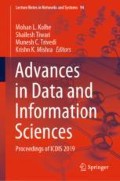Abstract
The inclusion of smartphone/mobile nodes as a part of grid computing increases the computation limits of the static grid while at the same time adds to the complexity owing to the associated factors like mobility, limited power, and weak wireless connectivity. This work presents a hybrid PSO-GA (Particle Swarm Optimization––Genetic Algorithm) based resource allocation strategy for reliable execution of jobs within a reasonable time for the computational mobile grid. Before allocating the task to the resources, the best nodes as per the fitness function are selected under the given constraints in order to meet the scheduling objectives. PSO-GA is a hybrid approach, proving to be more efficient and effective than single PSO or GA. Simulation study supports the effectiveness of the proposed approach.
Access this chapter
Tax calculation will be finalised at checkout
Purchases are for personal use only
References
Statista—The Statistics Portal. Retrieved April 15, 2018, from https://www.statista.com/statistics/330695/number-of-smartphone-users-worldwide/.
Rajaraman, V., & Murthy, C. R. (2003). Parallel computers. New Delhi: Architecture and Programming Prentice-Hall of India.
Berman, F., Fox, G., & Hey, T. (2003). Grid computing: Making the global infrastructure a reality. Wiley and Sons.
Foster, I., & Kesselman, C. (1998). The grid—Blueprint for a new computing infrastructure. Morgan Kaufmann.
Foster, I., & Kesselman, C. (2002). What is the grid? -a three-point checklist. GRID today2002.
Li-juan, D. U., Zhen-wei1, Y. U. (2010). Development of mobile grid. Computer Engineering and Design, 31(6), 1166–1169.
Duan, L., Kubo, T., Sugiyama, K., Huang, J., Hasegawa, T., & Walrand, J. (2014). Motivating smartphone collaboration in data acquisition and distributed computing. IEEE Transaction on Mobile Computing, 13(10).
Zeng, W.-Y., Zhao, Y.-L., Zeng, J.-W., et al. (2008). Mobile grid architecture design and application. In 4th International Conference on Wireless Communications Networking and Mobile Computing. WiCOM ‘08, pp. 1–4, Oct. 2008.
Viswanathan, H., Lee, E. K., & Pompili, D. (2012). Mobile grid computing for data- and patient-centric ubiquitous healthcare. The 1st IEEE Workshop Enabling Technologies for Smartphone and Internet Things (ETSIoT), pp. 36–41.
Singh, K. V., & Raza, Z. (2017). A quantum‐inspired binary gravitational search algorithm–based job‐scheduling model for mobile computational grid. Concurrency and Computation: Practice and Experience, 29(12).
Shatz, S. M., Wang, J. P., & Goto, M. (1992). Task allocation for maximizing reliability of distributed computer systems. IEEE Transactions on Computers, 41, 1156–1168.
Kartik, S., & Murthy, C. (1997). Task allocation algorithms for maximizing reliability of distributed computing systems. IEEE Transfer Computer Systems, 46, 719–724.
Attiya, G., & Hamam, Y. (2006). Task allocation for maximizing reliability of distributed systems: A simulated annealing approach. Journal of Parallel and Distributed Computing, 66, 1259–1266.
Kao, Y. T., & Zahara, E. (2008). A hybrid genetic algorithm and particle swarm optimization for multimodal functions. Applied Soft Computing, 8(2), 849–857.
Oshin, A. C. (2018). Hybrid PSACGA algorithm for job scheduling to minimize makespan in heterogeneous grids. In S. Bhattacharyya, S. Sen, M. Dutta, P. Biswas, H. Chattopadhyay (eds.) Industry Interactive Innovations in Science, Engineering and Technology. Lecture Notes in Networks and Systems, vol. 11. Springer, Singapore, 2018.
Author information
Authors and Affiliations
Corresponding author
Editor information
Editors and Affiliations
Rights and permissions
Copyright information
© 2020 Springer Nature Singapore Pte Ltd.
About this paper
Cite this paper
Singh, K.V., Raza, Z. (2020). Reliability-Based Resource Scheduling Approach Using Hybrid PSO-GA in Mobile Computational Grid. In: Kolhe, M., Tiwari, S., Trivedi, M., Mishra, K. (eds) Advances in Data and Information Sciences. Lecture Notes in Networks and Systems, vol 94. Springer, Singapore. https://doi.org/10.1007/978-981-15-0694-9_11
Download citation
DOI: https://doi.org/10.1007/978-981-15-0694-9_11
Published:
Publisher Name: Springer, Singapore
Print ISBN: 978-981-15-0693-2
Online ISBN: 978-981-15-0694-9
eBook Packages: EngineeringEngineering (R0)

